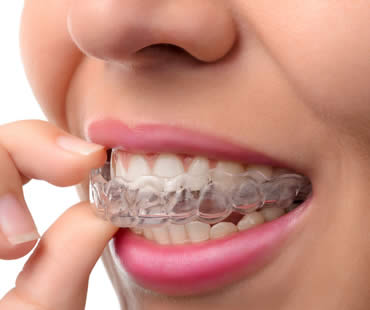
When you don’t have a full smile, your self-esteem and oral health decline. Implant restorations offer a solid solution for patients who have lost teeth. Designed to look and feel like your natural teeth, dental implants will rejuvenate an incomplete smile. Dental implants allow you to eat the foods you love, speak clearly, and laugh with confidence.
Constructed from biocompatible titanium, a dental implant is a small metal post surgically inserted into your jaw bone. The implant creates an artificial tooth root. Eventually, a permanent crown is placed on the post, restoring the function and appearance of your smile.
Although you can replace missing teeth with dentures or crown and bridgework, dental implants offer several advantages, including:
• Durability
• Longevity
• Natural Appearance
• Stability
Before suggesting dental implants, your dentist will evaluate your mouth and oral health to make sure you are a good candidate for implants. If you don’t have sufficient bone structure to support the implants, your dentist may suggest a bone graft. In most cases, dental implants have a 95 to 98 percent success rate.
With implant therapy, an oral surgeon or prosthodontist will position one metal post in each empty socket. Implants can replace one or more missing teeth. Once your mouth heals and bone fuses with the biocompatible post, your dentist will attach a lifelike prosthetic crown. Care for the implants as you would your natural teeth, brushing twice daily, flossing frequently, and visiting the dentist for routine checkups.
Dental implants dentist in Meriden

To improve the success of your dental implant surgery, there are a few guidelines you can follow during your recovery process. Diet is one of the most important factors to consider to ensure your implants heal properly.
Initially, you should not eat or drink hot foods for 24 hours after surgery as the heat could open the wound and cause an increase in bleeding. Avoid foods that may cause trauma to the gums or disrupt the implant, including the following:
- Hard foods such as candies, pretzels, nuts, and crunchy vegetables
- Chewy foods that require more than a couple of rounds of chewing such as rolls, gummies, hard fruit, and gum
- Foods that could stick in teeth or leave particles behind such as popcorn, seeds, and chips
- Foods or drinks that contain citric acid, such as oranges or grapefruit
Carbonated beverages
A soft diet is recommended for approximately two weeks after implant surgery to allow the gum tissue to heal. It is especially important to stay hydrated by drinking plenty of fluids, although you should strictly avoid the use of a straw for at least 48 hours post-surgery. Suggestions of ideal food and drinks after implant surgery would be:
- Cooked cereals such as cream of wheat or oatmeal
- Yogurt
- Scrambled eggs
- Cottage cheese
- Broth, bouillon, or soups
- Ground beef, baked or broiled fish, or baked or stewed chicken
- Macaroni and cheese
- Baked or mashed potatoes
- Soft bread
- Puddings, milkshakes or ice cream
- Water, milk, coffee or tea
Patients who maintain a healthy diet of soft foods feel better and heal faster after dental implant surgery. Following these guidelines will help to ensure the quickest and most successful recovery from your implant surgery.
Contact our Meriden dental office today to learn more about dental implants options.

Many people find foods such as cheese, yogurt, and milk to be a very enjoyable part of their diet. Not only are some of these dairy items tasty and nutritious, did you know they can also help your teeth and gums? Studies show that consuming dairy products regularly can lower the occurrence of dental diseases. Let’s see which dairy items you should consider incorporating into your diet and why.
Reduce gum disease
The primary benefit of dairy to your dental health is lowering your risk of periodontal disease. Also known as gum disease, this condition affects roughly 75 percent of Americans at some level. It may be minor gingivitis or advanced periodontitis. If left untreated, gum disease can cause tooth loss, contribute to heart disease and stroke, and worsen diseases like diabetes and osteoporosis. Lactic acid is one of the key ingredients in many dairy items, and researchers believe that lactic acid is related to reducing gum disease.
Choose your dairy
Just because a food is identified as a dairy product, that doesn’t necessarily mean it’s completely healthy for you. Here are some tips to help you choose the ideal foods and beverages for your dental health:
- Look for low fat and non-fat options.
- Choose white milk instead of flavored milk, such as chocolate. The added sugars can lead to tooth decay.
- Consider natural and organic products when possible.
- Select unsweetened yogurt without sugar or artificial sweeteners. A good alternative is Greek yogurt which you can add fruit or honey to create an appetizing, healthy snack.
Enjoy additional benefits
Avoiding gum disease isn’t the only benefit of eating dairy. It helps build strong teeth and bones, and is rich in vitamins that are good for your overall health. So the next time you get hungry, try some cheese or a glass of milk because these foods will not only satisfy your hunger but also keep you smiling.
We treat patients from Meriden and the surrounding area

Metal braces used to go hand-in-hand with teenage years. Those awkward years were made so much worse with the taunts of “metal mouth” or “brace face.” Today, if your teen is dreading those comments, there are alternatives, particularly Invisalign.
Has your teen been told that braces are a necessity? Is he or she fearful of time spent in metal braces? Invisalign could be the solution, providing an “invisible” way to straighten and align crooked teeth.
Not all teens are suited for treatment with Invisalign. The aligners must be worn diligently, up to 22 hours a day, in order to work properly. Teens may be tempted to remove them more often than recommended, leading to far longer treatment time or ineffectual treatment.
Changes in Invisalign treatment are addressing the specific needs of teens with solutions like the blue dot wear indicator, which allows dentists and parents to determine if the teen is wearing the aligner the recommended amount of time.
Power ridges provide the maximum force necessary to exact complex movements in the mouth, including the movement of tooth roots. Because some teens are still in the process of having their teeth erupt, Invisalign aligners can feature eruption tabs or other design elements for teeth that are still in the process of erupting.
Benefits like these allow Invisalign to cater to a teen’s specific orthodontic needs while still providing all of the things that make Invisalign aligners so popular with patients of all ages.
Invisalign makes it possible to remove the plastic aligners while teens are eating or cleaning their teeth. Metal braces can trap unsightly bits of food, leading to a teen being self-conscious. Oral hygiene habits remain far easier with Invisalign than with traditional metal braces. Flossing takes place normally, while flossing with traditional metal braces is very challenging.
If you have questions regarding whether or not Invisalign or traditional metal braces are right for your individual teen, talk to a skilled orthodontist today. Your orthodontist will determine if Invisalign will be the most effective treatment to address your teen’s orthodontic needs.
If you live in the Meriden area contact us today

It’s not uncommon for children to be afraid of going to the dentist. Let’s face it, many adults don’t like visiting the dentist either. However adults mainly don’t want to take the time or don’t want to hear the news that they aren’t taking good care of their teeth. It’s different with kids though, who often have a real fear of the dentist, equipment, and the unknown situation. If your child is one of those who experiences anxiety at the mention of the dentist, here are some things you can do to help ease those fears.
Use visual aids:
It is helpful for some children to watch a video or read a book that will help them become more familiar and comfortable with going to the dentist. Your local library or the internet both likely offer resources for this purpose, and bookstores have books and DVDs for purchase. These visual aids help kids know what to expect in visiting the dentist, and what their role is in the process.
Visit the office:
Take your child to the dentist’s office prior to your appointment so they can observe the office, meet the staff, and see the area and tools used for examinations. The staff may even give your child an explanation of the tools that dentists use for checkups. Your dentist wants children to feel comfortable and confident in getting dental treatment, so most offices do their best to help your child adjust.
Explain the importance:
Even though fear sometimes overtakes logic, it’s still important to explain to your child the reasons for seeing the dentist. Help them understand the benefits of checkups, and the oral health consequences that may occur by not caring for their teeth and getting regular checkups.
If you live in the Meriden area contact us today

You might have the idea that visiting the dentist isn’t that important in the overall picture of your health, but you’re wrong. Establishing a relationship with a good dentist is key to being healthy, and seeking treatment from a family dentist is a great way to spread that good health throughout your whole family.
Family dentists provide treatment for all ages. Dentists suggest that kids should begin visiting the dentist around their first birthday so that they can become adjusted to the environment and learn about proper hygiene. It’s helpful for little ones to go to the same dentist from the start, as they become comfortable with the staff and office. In theory, kids are able to go to the same family dentist their whole lives!
Adults, teenagers, and seniors are all able to visit the family dentist as well. These professionals are trained and experienced in handling dental conditions throughout all age ranges, from filling cavities common in the younger crowds to cosmetic treatments for the middle-aged to dental implants or gum disease in older adults. One dentist and one convenient location makes it easy on the whole family.
Dentists suggest getting checkups every six months for optimum oral health. That way examinations can catch and treat problems early, before they have a chance to worsen into serious issues. Professional cleanings keep your teeth healthy and looking great. Regular checkups can also improve your overall health, as studies show there’s a strong link between gum disease and issues like heart disease, diabetes, or stroke. Expectant mothers are also at higher risk of complications if they have gum disease. Oral cancer is another thing family dentists watch for during checkups. Chances of recovery are greatly increased when oral cancer is detected early.
The importance of having a family dentist cannot be downplayed. The smiles and the health of every member of your family will benefit.
Schedule your appointment at our Meriden dental office














